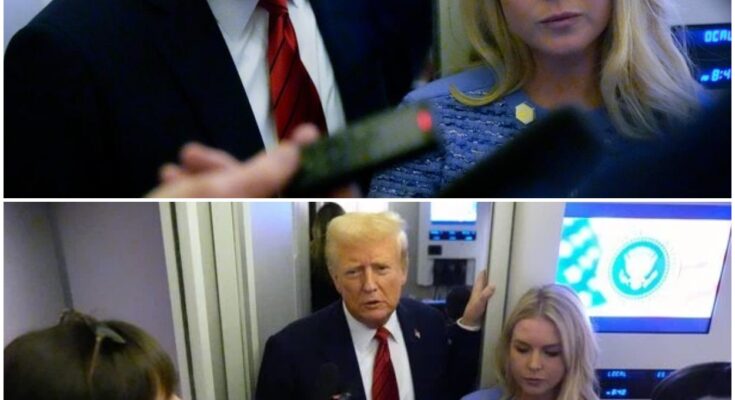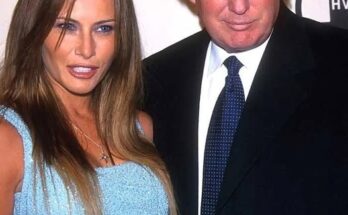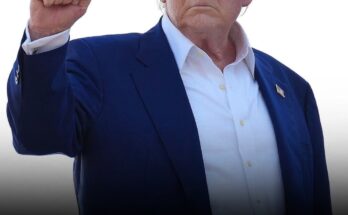White House Press Secretary Karoline Leavitt Faces Backlash After Deflecting Serious Question on Abuse of Power
In a press briefing earlier this week, White House Press Secretary Karoline Leavitt found herself under intense scrutiny after a heated exchange with New York Times White House correspondent Jonathan Swan.
The question posed to her was simple but loaded: Why was Donald Trump allowed to direct the Justice Department (DOJ) to investigate his political enemies, while when Biden was president, Trump did nothing but complain about Biden allegedly doing the same?
Swan’s question raised a critical issue—whether such actions amounted to an abuse of power and why there seemed to be a glaring double standard in the application of presidential authority.
The inquiry centered around Trump’s recent directive to the DOJ to investigate Chris Krebs, a former national security official. Krebs had previously asserted that there was no widespread voter fraud during the 2020 election, a stance that led to his firing by Trump.

Now, several years later, Trump has called for the DOJ to conduct a “fishing expedition” into Krebs, suggesting potential criminal wrongdoing simply because Krebs disagreed with him about the election results.
As tensions flared, Swan highlighted the hypocrisy and abuse of power inherent in such a move, questioning how this could be defended by the White House. Leavitt’s response, however, was nothing short of baffling, and many observers have criticized it as incoherent and evasive.
Leavitt’s “Gibberish” Response Sparks Outrage
Leavitt’s response to the question appeared to fail under pressure. Instead of addressing the substance of the accusation, she gave a response that left many in disbelief. “Look, the president signed that executive order.
It’s the position of the president in this White House that it’s well within his authority to do it. Otherwise, he wouldn’t have signed it, and he signed it, and that’s his policy,” Leavitt stated.
The response was quickly pounced on by critics who pointed out that Leavitt’s explanation offered no substantive justification for Trump’s actions.
Her statement was circular and failed to directly address the core of Swan’s question. By repeating that the president signed the order and thus had the authority, Leavitt seemed to dismiss any concerns about the legality or morality of the president’s actions, leaving the question of why it wasn’t an abuse of power unresolved.
Critics argue that this type of evasive non-answer only further reflects the incompetence and lack of preparedness in the current White House press office.
Leavitt, who has been in the role for only a few months, seems unable to provide a clear defense for actions taken by the president, instead resorting to vague assertions about presidential authority.
The Backstory of Chris Krebs and the DOJ Investigation
To understand the gravity of the situation, it is crucial to recognize the background of Chris Krebs. Krebs, who served as Director of the Cybersecurity and Infrastructure Security Agency (CISA), was a key figure during the 2020 election. He publicly debunked Trump’s false claims of widespread voter fraud, stating that the 2020 election was one of the most secure in U.S. history.
Krebs’ stance directly contradicted Trump’s claims, and in retaliation, Trump fired him. This incident was one of many where the Trump administration clashed with officials who disagreed with the president’s narrative.

However, Krebs’ story did not end there. Despite being removed from his position, Krebs remained a vocal defender of the integrity of the election, further angering Trump.
Now, years later, Trump’s call to the DOJ to investigate Krebs appears to be politically motivated—a move that many see as an abuse of presidential power.
The idea of using government agencies to target political opponents is a troubling prospect, and the question of whether such behavior is justified in a democracy is an issue that needs to be addressed.
The Problem with Leavitt’s Deflection
Instead of answering the key question of whether this was an abuse of power, Leavitt chose to deflect. Her reliance on the claim that Trump’s executive order gives him the authority to investigate Krebs seems to ignore the fundamental concern raised by Swan.
Whether or not the president has the legal right to do so is one issue, but whether it is ethical or in line with the norms of democratic governance is another.
Leavitt’s inability to articulate a reasonable justification for Trump’s actions points to a deeper issue within the current White House communication strategy.
Press secretaries are expected to defend the actions of the president, but they are also expected to be able to provide clear and coherent answers to difficult questions. Leavitt’s response not only failed to address the core issue, but it also reinforced the perception that she is ill-prepared for the role she occupies.
Trump’s Administration and the Abuse of Power Narrative
Leavitt’s deflection comes at a time when questions surrounding Trump’s use of power and his interactions with government institutions are at the forefront of political discourse.
Critics have long argued that Trump’s behavior, both in office and after leaving office, has posed serious risks to the integrity of the democratic process.
The question of whether a president should be able to use the power of the office to target political opponents has been a key point of contention throughout Trump’s presidency and continues to resonate with critics.
Leavitt’s failure to effectively respond to the question about Trump’s abuse of power only adds fuel to the fire. By not addressing the concerns raised by Swan, she is seen as complicit in allowing the president to abuse his power without accountability.
The role of a press secretary is not just to repeat talking points, but to engage with the media and the public in a meaningful way, ensuring transparency and trust in government actions.

Will Leavitt Survive the Pressure?
As the pressure continues to mount on Leavitt, many are questioning her future in the role. With her early performance marred by confusion and deflection, it is unclear how long she will remain in the position. Historically, Trump’s press secretaries have not lasted long, and it is possible that Leavitt will follow in their footsteps.
Despite her shortcomings, it is likely that Leavitt will find a soft landing after her tenure at the White House ends. Given her connections and the visibility of her role, she could very well land a lucrative contract with Fox News or another conservative media outlet.
However, until then, the American public will be left to grapple with the implications of her performance in the press briefings and her inability to effectively defend the actions of the president.
Karoline Leavitt’s response to Jonathan Swan’s question regarding Trump’s abuse of power is emblematic of the dysfunction and lack of clarity that has plagued the current White House press office.
Her inability to provide a clear answer only serves to undermine the credibility of the administration. With more difficult questions likely to come in the future, it remains to be seen how Leavitt will handle the increasing pressure. One thing is certain—her performance thus far has raised serious doubts about her qualifications for the role.





